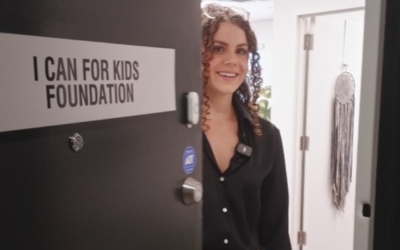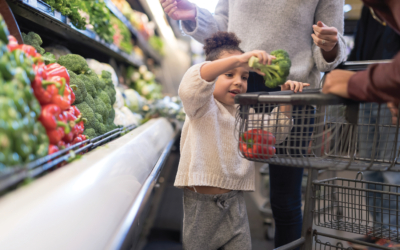When we shifted our programming from food provision to grocery gift cards, a handful of supporters asked I Can for Kids (iCAN) whether any of our recipients might use our support to buy ‘temptation items’ such as alcohol and tobacco. In this blog, we turn to the current evidence that helps address this concern. We’ve summarized a variety of studies that explore how low-income and food-insecure populations choose to make the most of their limited household budgets.
What do we know about the way food-insecure households budget their money?
Years of research show that food-insecure households continually need to juggle trade-offs because they lack the finances to pay for all their basic needs. Food insecurity emerges because families are forced to prioritize competing expenses, such as housing, medication, or clothing. An analysis of the way Canadians spend their money compares the behaviours and decisions of food-secure and food-insecure populations. The results show how households living with food insecurity:
- spend less money overall on all types of basic expenses, including food
- must dedicate all or most of their total budget just to meet some of their basic needs
- prioritize their spending on housing, followed by food, and then transportation
- allocate less money towards leisure, clothing, insurance, investments, and items such as vehicles, sports equipment, furniture, and toys
How do food-insecure households prioritize which foods they purchase?
Research in high-income countries shows that food availability, access, and affordability exert the greatest influence on the types of groceries most of us choose to buy. However, due to financial constraints, food-insecure families always rely on price and affordability as the dominant forces behind their purchasing decisions and behaviours. A study among several hundred low-income and food-insecure families examined the factors that had the greatest influence on the food parents chose to buy for their households. The researchers uncovered the following key themes:
- paying rent was the highest priority while food budgets continually fluctuated and remained unpredictable
- many families made minimum utility and bill payments to avoid losing services yet still reserve a bit of money to buy some food for their children
- parents reduced food costs through thrifty practices such as using coupons, taking advantage of sales, and purchasing items in bulk
- price was the overriding factor that dictated which foods a family chose to buy
- food preferences influenced purchasing behaviours because parents didn’t want to waste money on products their children might not eat
- buying the healthiest foods possible within a limited budget remained a high priority
How do income-based responses like grocery gift cards influence household choices?
There is limited evidence on the way food-insecure households choose to invest income subsidies like grocery gift cards. Although our research is the first to investigate the use of grocery gift cards in Canada, there is growing interest in the impact of this type of response. Three unique studies show that:
- grocery gift cards help reduce financial distress because families can free up some budget to pay other major bills, particularly rent
- low-income families use grocery gift cards to improve their children’s diet quality and fruit and vegetable intake without increasing the consumption of unhealthy foods
- food-insecure college students prefer to receive grocery gift cards rather than gift cards for restaurant delivery services because grocery cards help them reduce stress, increase purchasing power, make healthier food choices, and improve their ability to study
What type of spending do we observe among grocery gift card recipients?
Our evaluations and research show that one of the greatest benefits of our income-based approach is ensuring vulnerable families can maintain stable housing while freeing up money for groceries. Sadly, many food-insecure populations consider regular meals a ‘nice-to-have’ option because their shelter costs remain totally inflexible and out of their control. The following results also reinforce the likelihood that food-insecure families will prioritize rent and basic needs over temptation items when they gain access to income subsidies and grocery gift cards:
- on average, a $100 increase in rent leads to a 22% increase in the risk of becoming food insecure for low-income households living in major cities across Canada
- in Canada, low-income families choose to invest federal child tax benefits on rent, food, childcare, education and transportation rather than temptation goods such as restaurants, alcohol, and tobacco
- 40% of our housed recipients face an ongoing risk of being asked to vacate their homes, particularly as rental rates continue to climb across our city
- In 2023, eviction was the second most common reason parents needed to access our program and many families had to use part of their budget to pay for moving costs
What do our recipients tell us?
Despite all the great evidence, iCAN knows that it’s still much more important to learn from the experiences of our recipients and the agency partners who help them navigate complex systems. We’ve included a few testimonials that speak to the power of income-based supports such as our grocery gift card model:
- “I was facing eviction and didn’t have enough money to even buy groceries. The grocery gift card went a long way for me to feed my daughter so she had lunches for school. I truly could not think of a more generous way to give back to community. Not enough words in the world to thank you!” Single mother, one child
- “A client was injured on the job and was not receiving a paycheque. As the sole provider she was unable to provide food, pay bills and rent. Not only was she unable to feed her children but she was also at risk of losing her housing. The I Can for Kids gift cards provided immediate relief for the family and we helped the client with additional referrals to secure her housing.” Agency Partner
- “A single mom with four children could not pay rent on time. When visiting the home, we learned that mom took a student loan to go to school. She had finished the program and had been looking for a job for the past 4 months. She had been living off her child tax benefit and barely had any staples left to make a meal for the children. I gave her I Can for Kids grocery gift cards and she cried.” Calgary Housing Company
When you donate to our program, you contribute to a powerful force for positive change that empowers food-insecure families to achieve a much healthier life balance.
To join iCAN’s expanding list of donors, sponsors, and champions, check out the different ways you can get involved or donate.
To learn more about I Can for Kids and their unique approach to childhood food insecurity, visit www.icanforkids.ca
About Donald Barker
Donald Barker has worked as a registered dietitian for more than 25 years. He also has a professional background in communications and has long advocated for populations who face adverse, unjust, or systemic barriers that lead to higher rates of poor social, mental, emotional, and physical health outcomes. Donald currently volunteers as an Advisor with iCAN to support our transition towards evidence-based approaches that help improve the well-being of children in Calgary who live in low-income and food-insecure households.
About I Can for Kids Foundation
I Can for Kids works closely with multiple agency partners to target and distribute grocery gift cards to food-insecure families who are most in need. The iCAN grocery gift card program is a more dignified and inclusive approach to dealing with food insecurity, allowing families to shop where everyone else shops and to choose foods that are appropriate for their health and cultural needs. Explore their website to discover more about iCAN’s impact over the years.
For more information and media inquiries, please contact iCAN Executive Director, Bobbi Turko at bobbi@icanforkids.ca.




